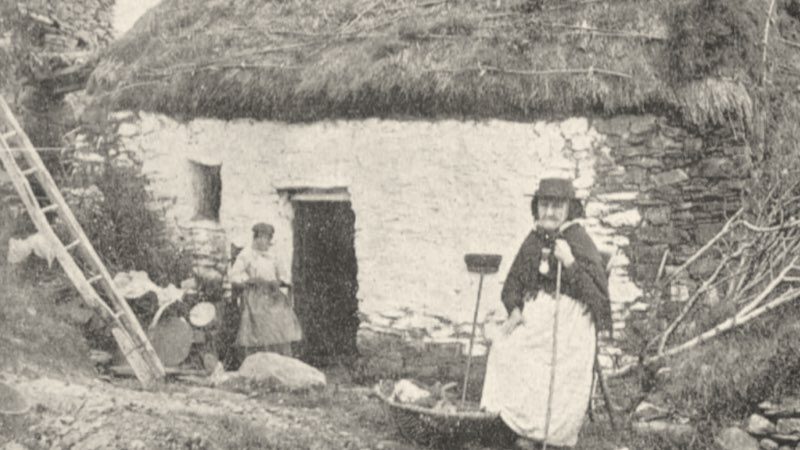
The Life And Testimony Of Ann Bell
Gospel Standard 1869:
Died at Oakham, Nov. 24th, 1868, Ann Bell, aged 52.
Mrs. Bell was much impressed with the value of the soul, and the importance of religion at an early age. She could say she never hated God’s people, but felt towards them a mixture of veneration and admiration, which in after years ripened into the warmest love. She was very gradually taught her lost and helpless state as a sinner, and as light increased, her efforts to work out a righteousness to please the Lord were changed into prayers that she might know him; and, through the power of grace, she was enabled to follow on, until he manifested himself to her. One of our friends well remembers the earnestness with which she expressed this reigning desire of her soul, to know the Lord as her salvation, when she was young and serving an apprenticeship with a dressmaker, and her own full conviction that the desire was of the Lord, and that he would fulfil it.
She attended the ministry at Providence Chapel from its being first opened. Mr. Gadsby’s preaching was attended with more power and savour to her soul than any other she heard at that time.
On her marriage she was removed to Melton Mowbray. Leaving the ministry at Oakham was a sharp trial to her, and she was impressed with the belief that much of the trial she experienced was on that account. Every succeeding providence to the end of her days, even those apparently prosperous, eventually added some bitterness to her cup. She was often tried because she had not been the subject of such cutting convictions as others, the work having been so gradual that she could not clearly date its commencement; but I think she was much relieved on this point by a sermon which she heard at Leicester, preached by the late Mr. Brown, from the words, “I will bring the third part through the fire.” After some time she returned to Oakham, but to her great sorrow, was unable, through her much increased deafness, to hear a preached gospel. Once only, she heard these few words, “Your heavenly Father knoweth,” which were attended with such power to her soul as not only reconciled her, in some measure, to the Lord’s will, but raised up faith to believe he was her God and Father indeed. This she often looked back to, as a stone of help, and I really think the savour and sweetness of those words never wholly left her. They were Delivered by Mr. Philpot.
To extreme deafness was added a weak and afflicted tabernacle, and at times she was much tempted to repine and rebel against the Lord. One day, when in this state, a few verses on murmuring were lent her, which were the means of breaking her heart into contrition, shame, and confession before the Lord, and such passiveness of spirit was wrought as she had never experienced before.
After several years, two children were given to her; one, a girl, was taken away at about five years of age. There was a hard struggle in the mother’s breast, but after great wrestling with the Lord, he not only satisfied her respecting the child, but so blessedly manifested himself to her soul as to enable her to set up another Ebenezer, and go on her way with renewed strength.
In 1866 she and her husband were baptized by Mr. KnilL The church received the account she gave them with sympathy and satisfaction.
She was in a very poor state of health at this time. A friend called to see her the day after her baptism, and found her not only something better in body, but very much favoured in soul. She said how Toplady’s hymn, “When languor and disease invade,” &c., was blessed to her, as she sat by the water side. “Ah!” she said, “I thought I saw the dear Saviour baptized in water, then in blood; and then these lines came into my heart:
‘Sweet to remember that his blood
My debt of suffering paid.’
Then my mind rested upon the third verse, then upon the fifth, then upon the last; and then I began at the first verse, and went through the whole hymn.” Being unable to hear what was passing, it thus appeared that her mind was kept stayed and meditating upon the sweetness of these eternal realities.
The same friend calling a few days afterwards, she said, “I have lost all my sweet feelings. The Lord has withdrawn, and I have mourned after him as a child after its mother, taken up the lamentation of Hart:
‘I hope, I grieve, I faint;'”
More frequent let thy visits be,
Or let them longer last;
I can do nothing without thee;
Make haste, my God, make haste.'”
As disease advanced, the Lord enabled her to look death in the face without dismay. Walking out a little one day, being weary, she sat down to rest, when the words, “In my Father’s house are many mansions,” &c., were very blessedly applied; so that by faith she entered in and enjoyed a sweet foretaste of “The joy prepared for suffering saints.” She said, “If my husband and boy had seen me crying, they would have thought it was for the loss of my brothers; but I wept for joy, and longed to depart. I fear it was almost impatience.” She had lost three brothers in about the space of a year. Those who frequently saw her can testify how graciously the Lord supported her and gave her patience. One evening in August she was complaining of the old spirit of rebellion under sufferings, but said, “I have been reading Mr. P.’s sermon, No. 124 ‘Gospel Pulpit,’ and I can say I know it all by experience.”
A friend who spent an hour or two with her one evening about this time, much enjoyed the depth and savour and richness of experience with which she was favoured. With what submission she spoke of her many trials, which were deep, close, and peculiar, and how she justified the Lord in all his dealings with her, and said, “All were needful, all for the mortification and crucifixion of the flesh, that the spirit might be saved,” and she spoke very blessedly upon Matt. 10:24 to the end. This conversation left the impression that the Lord was either preparing her for her dissolution, or for some keen trial, and it proved that the one was to precede the other. The Sunday following, her husband was taken very ill, and was confined to his bed with fever for four weeks. The second week their only child was prostrated, and he died Sept. 22nd, aged 12. Thus earthly ties were rent asunder and she was loosened from earth, and it became evident that she was soon to pass away. A friend remarked to her, “Your weakness increases; you will not be long here.” She replied, “I think not; I wish to go when the Lord pleases; but I shrink from pain and suffering. I should like to be taken away gently, or in my sleep. I have many years wished to die a triumphant death, but now I can leave it with the Lord.”
On the first Monday in November, she said, “I was much cast down, because I had no sensible enjoyment; but I read yesterday the account of Joseph T., in the “Gleaner.” That broke the snare. “The just shall live by faith and not by sensible enjoyments;” and on the last Lord’s day evening, she directed her husband to read it, and said, “I have no joy, but the Lord is my righteousness.” The latter she often repeated during the few days afterwards she lived. She took a most affectionate leave of her friends, and blessed them in the name of the Lord, and expressed most firmly her assurance of the Lord’s eternal favour to her soul, and that he would never leave nor forsake her.
The last few days she suffered much through pain and exhaustion which, together with her deafness, rendered it impossible to converse much with her. The Lord’s day evening before she died, she told her husband that before this last illness began, hymn 992 was applied to her: “Poor and afflicted, Lord, are thine.” Also that sweet promise, “I will never leave thee, nor forsake thee;” and added, “The Lord has given me, since I have been on this bed, some promises within these last few weeks, and I believe he will take me to himself.
“‘There shall I bathe my weary soul,
In seas of heavenly rest.
And not a wave of trouble roll
Across this peaceful breast.'”
One who was with her, referring to something she did not hear, said, “You can hear the Lord’s voice, even his whisper;” she replied, “Yes, sweetly at times.”
The morning she died, she said to the same friend, “I hope you will not suffer as I do.” Her friend said, “It will soon be over, and then heaven will make amends for all.” She answered, “Yes, it will.”
When she was very near her end, a friend having one hand, and her husband the other, she looking very earnestly at each, but unable to speak, the friend pointed upwards, and said, “Rest there.” As quick as thought, she gave a nod of assent, and shortly afterwards entered into that rest for which she had often ardently longed.
O for grace to follow her as she followed Christ in her life and conversation, in her separation of heart from the world; for she passed through it as “a stranger and a pilgrim,” more so than any one I ever knew. Her deafness kept her in much solitude, and the Lord overruled the affliction in his tender pity, and showed her many sweet and blessed things out of his word, and often communed with and cheered her spirit. Her garments were unspotted. Few knew her trials and temptations, and when clouds gathered over her soul, she was ready to say, “My way is hid from the Lord.” But, no! His eyes were not eyes of flesh. Her heavenly Father knew all, saw all, and delivered her from the fowler’s snare. Promise after promise beamed to cheer her onward to her heavenly home, and an everlasting day has dawned upon her soul. “The Lord is her everlasting light, and the days of her mourning are ended.”
H. W.
Oakham, Dec. 4th, 1868
Ann Bell (1816-1868) was a Strict and Particular Baptist believer. Early in her walk with the Lord, she was richly blessed under the gospel ministries of men such as William Gadsby. However, she lived under the burden of many hardships and sorrows. After losing her hearing, she lost her first child (aged of five) and her second (aged of twelve). Although the grief contributed to her early departure from this world, she bid farewell rejoicing in the God of her salvation.



